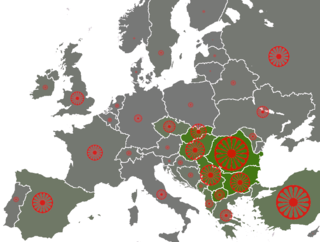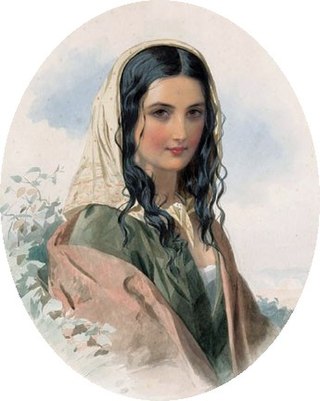Related Research Articles

The Romani, colloquially known as the Roma, are an Indo-Aryan ethnic group and traditionally nomadic itinerants. They live in Europe and Anatolia, and have diaspora populations located worldwide with significant concentrations in the Americas.
Pikey is a slang term, which is pejorative and considered by many to be a slur. It is used mainly in the UK to refer to people who are of the Traveller community, a set of ethno-cultural groups found primarily in Great Britain and Ireland. It is also used against Romanichal Travellers, Welsh Kale, Scottish Lowland Travellers, Scottish Highland Travellers, and Funfair Travellers.
Angloromani or Anglo-Romani is a mixed language of Indo European origin involving the presence of Romani vocabulary and syntax in the English used by descendants of Romanichal Travellers in the United Kingdom, Australia, Canada, New Zealand, United States, and South Africa.
Damian Le Bas was a British artist associated with the Outsider Art label, as well a leading exponent of the "Roma Revolution" in art.

Romanichal Travellers are a Romani subgroup within the United Kingdom and other parts of the English-speaking world. There are an estimated 200,000 Romani in the United Kingdom; almost all live in England. Most Romanichal speak Angloromani, a mixed language that blends Romani vocabulary with English syntax.
Benjamin Myers is an English writer and journalist.

The Romani flag or the flag of the Roma is the international ethnic flag of the Romani people, historically known as "Gypsies", which form a stateless minority in countries across Eurasia, Africa, the Americas, and Australasia. It was approved by the representatives of various Romani communities at the first and second World Romani Congresses (WRC), in 1971 and 1978. The flag consists of a background of blue and green, representing the heavens and earth, respectively; it also contains a 16-spoke red dharmachakra, or cartwheel, in the center. The latter element stands for the itinerant tradition of the Romani people and is also an homage to the flag of India, added to the flag by scholar Weer Rajendra Rishi. It superseded a number of tribal emblems and banners, several of which evoked claims of Romani descent from the Ancient Egyptians.

The Appleby Horse Fair, also known as Appleby New Fair, is "an annual gathering of Gypsies and Travellers in the town of Appleby-in-Westmorland in Cumbria, England." The horse fair is held each year in early June, attracting roughly 10,000 Gypsies and Travellers, about 1,000 caravans, several hundred horse-drawn vehicles, and about 30,000 visitors. The Gypsy and Traveller attendees include British Romanichal, Irish Travellers, Scottish Gypsy and Traveller groups, Kale and more.
The title King of the Gypsies has been claimed or given over the centuries to many different people. It is both culturally and geographically specific. It may be inherited, acquired by acclamation or action, or simply claimed. The extent of the power associated with the title varied; it might be limited to a small group in a specific place, or many people over large areas. In some cases the claim was clearly a public-relations exercise. As the term Gypsy is also used in many different ways, the King of the Gypsies may be someone with no connection with the Romani.
Delaine Le Bas is a British artist from a Romany background.

Anti-Romani sentiment is a form of anti-Indian sentiment which consists of hostility, prejudice, discrimination, racism and xenophobia which is specifically directed at Romani people. Non-Romani itinerant groups in Europe such as the Yenish, Irish and Highland Travellers are often given the name "gypsy" and confused with the Romani people. As a result, sentiments which were originally directed at the Romani people are also directed at other traveler groups and they are often referred to as "antigypsy" sentiments.

The Roma people have several distinct populations, the largest being the Roma and the Iberian Calé or Caló, who reached Anatolia and the Balkans in the early 12th century, from a migration out of the Indian subcontinent beginning about 1st century – 2nd century AD. They settled in the areas of present-day Turkey, Greece, Serbia, Romania, Croatia, Moldova, Bulgaria, North Macedonia, Hungary, Albania, Kosovo, Bosnia and Herzegovina, Czech Republic, Slovenia and Slovakia, by order of volume, and Spain. From the Balkans, they migrated throughout Europe and, in the nineteenth and later centuries, to the Americas. The Roma population in the United States is estimated at more than one million.
Scottish Travellers, or the people in Scotland loosely termed Romani persons or travellers, consist of a number of diverse, unrelated communities that speak a variety of different languages and dialects that pertain to distinct customs, histories, and traditions.

The Romani people are also known by a variety of other names; in English as gypsies or gipsies, and Roma; in Greek as γύφτοι (gíftoi) or τσιγγάνοι (tsiggánoi), in Central and Eastern Europe as Tsingani ; in France as gitans besides the dated terms bohémiens and manouches; in Italy as rom and sinti besides the dated terms zingari, zigani, and gitani; in Spain as gitanos; and in Portugal as ciganos.
The Royal Society of Literature Jerwood Awards for Non-Fiction were financial awards made to assist new writers of non-fiction to carry out new research, and/or to devote more time to writing. The awards were administrated by the Royal Society of Literature on behalf of the Jerwood Charitable Foundation.

Róisín Mullins is a TV presenter, TV talent show judge, professional Irish dancer, singer, stage show owner and choreographer.

Mikey Walsh is a British writer and columnist.
Leeds University Library's Gypsy, Traveller and Roma Collections are one of the five Designated collections held by the Brotherton Library at the University of Leeds. They comprise an extensive range of international books, manuscripts and archives relating to Gypsy, Traveller and Roma culture. Most of the collections are not about or by the communities but relate to the way they have been represented in the past.

Romani people have been recorded in the United Kingdom since at least the early 16th century. Records of Romani people in Scotland date to the early 16th century. Romani number around est. 225,000 in the UK. This includes the sizable population of Eastern European Roma, who immigrated into the UK in the late 1990s/early 2000s, and also after EU expansion in 2004.
References
- ↑ "Damian Le Bas". Travellerstimes.org.uk. Retrieved 22 October 2018.
- ↑ "Damian Le Bas". bbc.co.uk. Retrieved 19 December 2018.
- ↑ "The Alpine Fellowship".
- ↑ Adams, Tim (19 June 2018). "The Stopping Places by Damian Le Bas review – an illuminating history of Travellers". The Guardian . Retrieved 22 October 2018.
- ↑ Stroud, Clover (1 July 2018). "The Stopping Places by Damian Le Bas, review: a stunning memoir of Gypsy life". Telegraph.co.uk. Retrieved 22 October 2018.
- ↑ Annesley, Jackie (3 June 2018). "Review: The Stopping Places: A Journey Through Gypsy Britain by Damian Le Bas — inside a world we never see". Thetimes.co.uk. Retrieved 22 October 2018.
- ↑ "Gypsy Britain: the community behind the media panic". Newstatesman.com. Retrieved 22 October 2018.
- ↑ "Was there ever anything romantic about the Romany life? - The Spectator". Spectator.co.uk. 9 June 2018. Retrieved 22 October 2018.
- ↑ "BBC Radio 4 - Book of the Week, The Stopping Places, Episode 1". BBC. Retrieved 22 October 2018.
- ↑ "Royal Society of Literature » RSL Jerwood Awards". Rsliterature.org. Retrieved 22 October 2018.